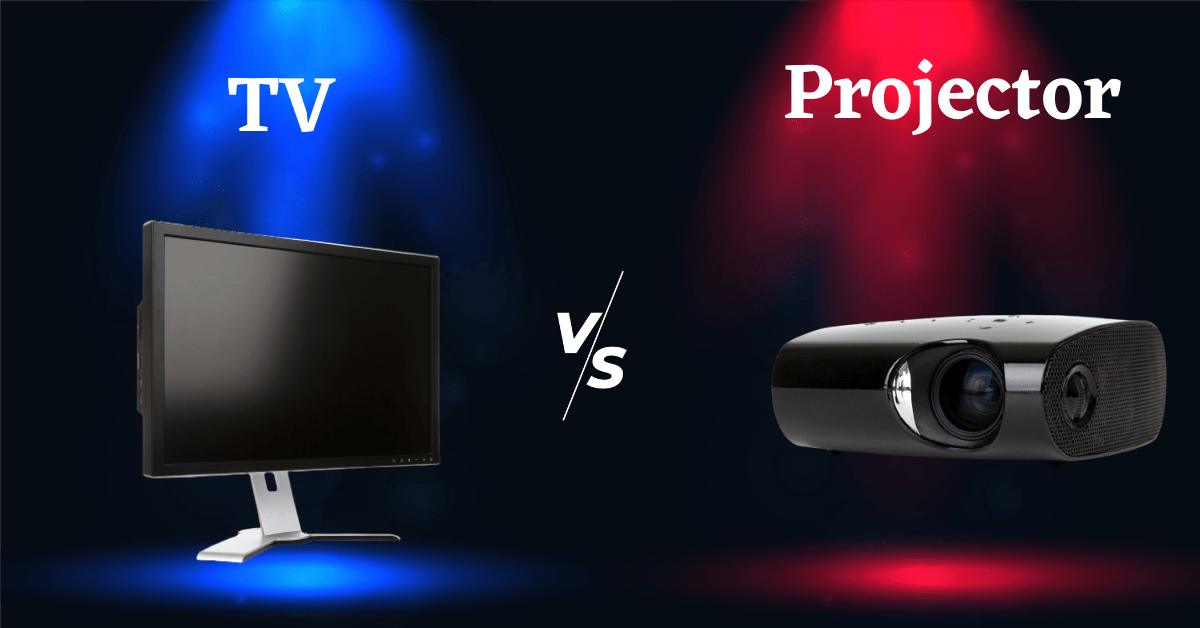Last Updated on July 1, 2024 by Admin
If you had to decide between a TV vs Projector setup, which one would you opt for?
Both TVs and Projectors come with their advantages and drawbacks. To decide between them, we to consider several factors, which we are going to discuss in this article today.
After reading this article, it will be easy for you to choose between the TV Vs projector, that suits your requirements and space.
Page Contents
Is Projector Better Than TV?
As we progress through 2024, an increasing number of people are considering projectors as a viable alternative to traditional TVs. But is a projector truly better than a TV in every scenario?
Projectors do have some advantages over TV in some cases, but they also have their drawbacks. As experts in projectors, one might assume that we would naturally speak in favor of projectors. However, we will conduct an unbiased comparison between TV Vs Projectors. Ultimately, the decision of which is more suitable for you will be yours to make.
Let’s explore the key differences, advantages, and factors to help you determine whether a projector or TV is the best choice for your needs.
TV Vs Projector – Factors to Consider:
Here we are going to compare each aspect of TV and Projector to see which has more advantage over the other.
1. Brightness & Contrast:
When it comes to Brightness and Contrast, TVs definitely have the upper hand. The light panel behind the TV screen emits light, which makes it much brighter. On the other hand, a Projector projects images. So, the projectors work best in specific environments only, which we will be discussing next. Here the Television gets an upper hand.
Television – 1
Projector – 0
2. Environment:
While Comparing between TV Vs Projector, a Projector needs a dark environment to provide a better experience. Hence, movie theatres have all the lights closed. It is because the light in the room will interfere with the light thrown by the Projector, which results in dull picture quality.
You can However get a special Projector for Bright Room, that has high lumens.
On the other hand, LED TVs show a brighter image even if there are several lights in the room. The Old CRT Televisions had a Glass surface that would reflect the light, but the latest technologies (LED, OLED, QLED TVs) have overcome the issue.
So, for a brighter room or environment, you may want to use the TV. While using Projector, you should close all doors and windows, which also blocks ventilation.
Note that there are also the latest Types of Projectors that work well in daylight as well. They still may not be as bright as TVs, but they are sufficient.
Once again Television got an advantage over the Projector.
Television – 2
Projector – 0
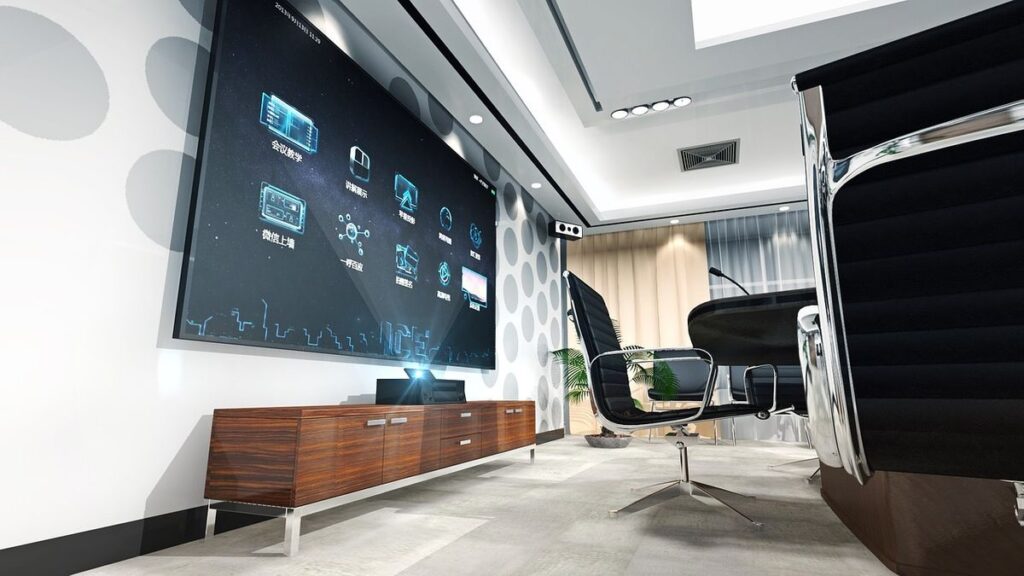
3. Good for Eyes:
Watching TV for a long time could damage the eyes, especially if you are watching it in the dark or by sitting close to it. Some people even experience a headache after watching TV for several hours. The rays coming out of the TV can damage the eyes and skin in the long term.
On the other hand, the Projector throws a projection on the wall. So, it does not affect the eyes in any way. Just make sure, you don’t look into the projector lens.
If you like to watch movies or play games late at night, then you should definitely choose Projector over TV to protect your eyes and health. Moreover, if your kids are addicted to Phones and TV, you should consider replacing them with a Projector.
Television – 2
Projector – 1
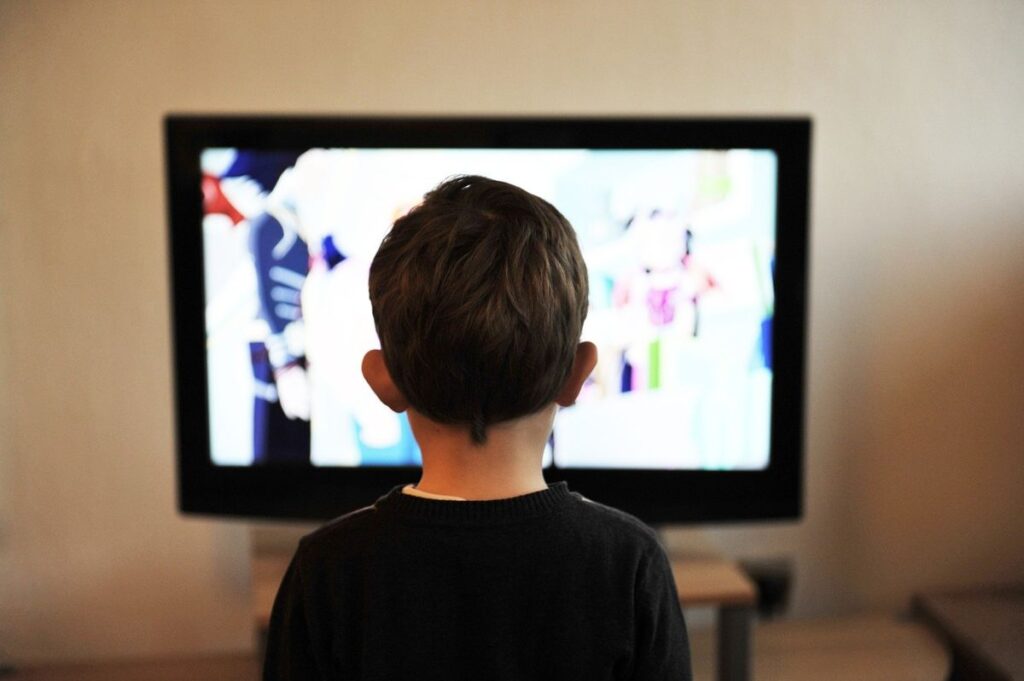
4. Screen Size:
The average size of a TV nowadays is 60 inches. Once you bought a TV, you cannot change the screen size. The Smart Television by LG is 325 inches, which is the largest TV to date. Considering the size, the price of the TV would be very high that only a few people in the world can afford it.
Whereas, Projectors with 450″ inch projection are available at a very affordable price. You can even adjust the Projection size according to the size of the surface. Moreover, it is impossible for Televisions to beat Projectors in Screen Size even in the future.
However, you may have to purchase a Large Projector Screen if you don’t have plain walls.
Television – 2
Projector – 2
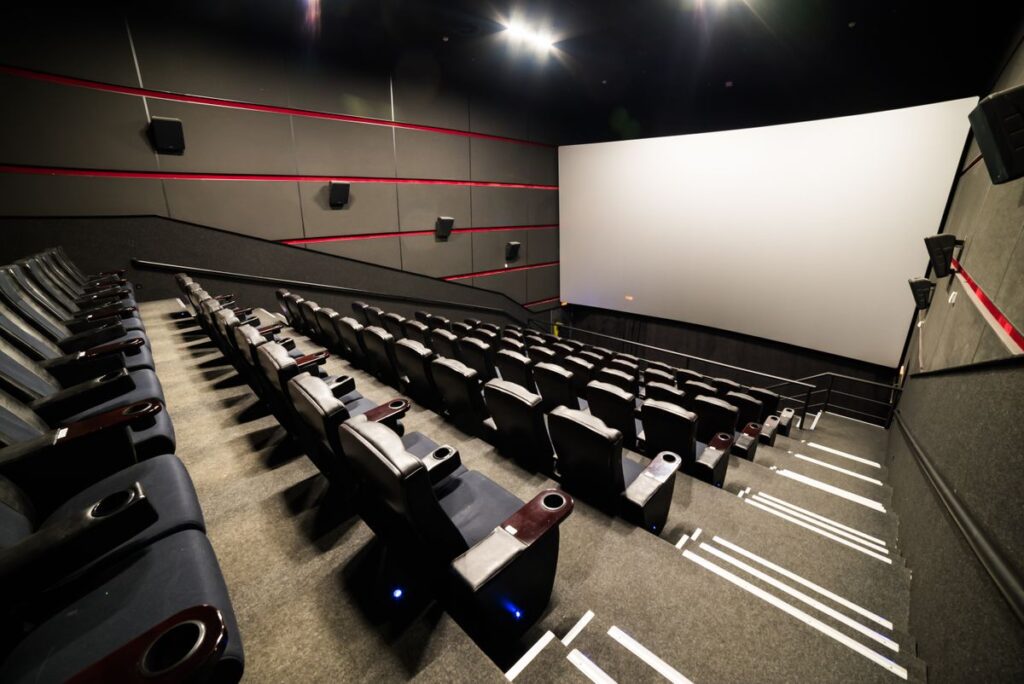
5. Resolution:
Both TVs and projectors offer 4K resolution. However, to fully appreciate 4K resolution, you need a larger screen. Watching 4K content on a 1080p TV won’t enhance your viewing experience, and you can’t easily increase the size of your TV. Conversely, you need a 4K projector to display in 4K resolution, but you can adjust the screen size according to the projector’s throw distance. Moreover, projectors offer the advantage of adjusting screen size according to resolution to avoid blurry and pixelated images. Therefore, projectors gain a slight edge over televisions in this aspect.
Television – 2
Projector – 3
6. Maintenance:
When considering maintenance, TVs generally require less ongoing care compared to projectors. TVs generally need screen cleaning. And, Screen replacement issue would arise after several years. In contrast, it is necessary to replace projector lamp from time to time. However, the latest LED Projectors have an LED light source, which lasts longer. Besides that, you need to clean the filter as it catches dust very quickly. Moreover, it is recommended to keep projectors in a well-ventilated area to prevent overheating. So, TVs offer simplicity and lower maintenance overall compared to Projectors.
Television – 3
Projector – 3
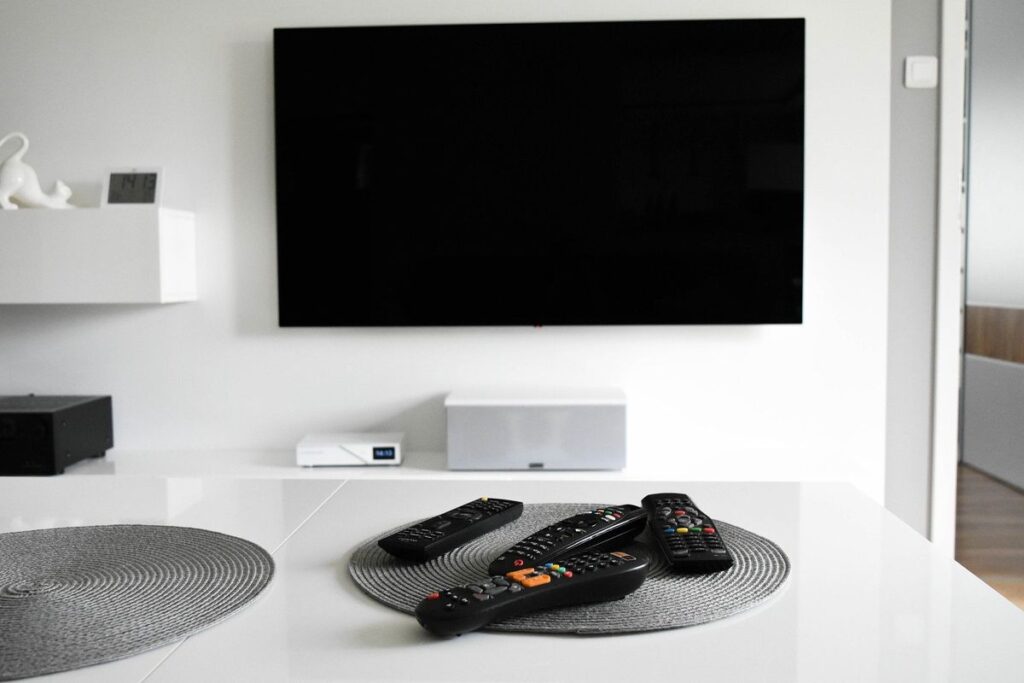
7. Installation:
It would require a Technician to Wall mounting a TV or a Projector.
Nevertheless, you can simply place the TV on a Stand, and connect the cables. On the other hand, projectors require precise placement several feet away from the screen at a specific angle, with initial adjustments like keystone correction.
You can check How Far Does Projector Need To Be From Screen.
There are no such requirements for TV. One can purchase a TV and place it anywhere in the room. So, once again TV gets the upper hand.
Television – 4
Projector – 3
8. Space:
TV and Projector both require adequate space. You should have enough space on the wall to mount a TV. And, when it comes to the projector, you need to have a plain wall to project the image. Also, as we discussed earlier, you need to keep the Projector at a specific distance from the wall to get a larger image.
Both options have their advantages and disadvantages in this regard. However, if you have a room full of furniture, you can get a portable Bluetooth Projector and a Pulldown Screen (or foldable cloth screen).
In some places, it is not possible to use a TV. But, there are several types of Projectors and several Types of Projector Screens that will help you set it up in any space. (All you need to do is pick the right Projector and Projector Accessories)
Television – 4
Projector – 4
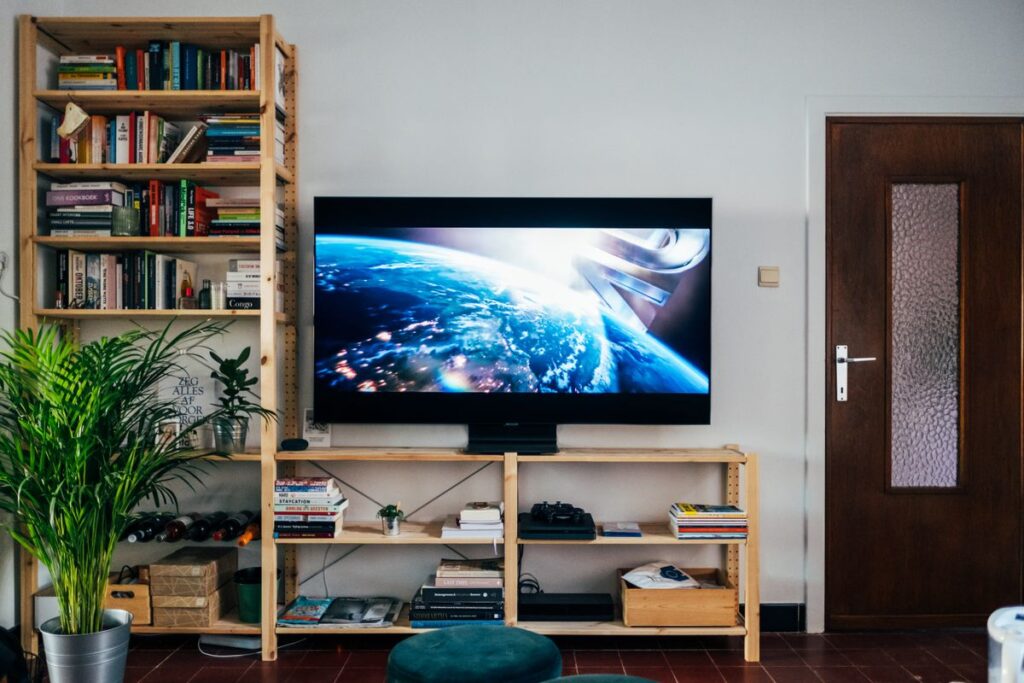
9. Sound Quality:
Here is one of the main comparisons between TV Vs Projector. Most televisions include built-in speakers with good sound quality. On the other hand, only some Projectors have the built-in speaker option. Moreover, the sound quality is not up to the mark. These speakers primarily serve basic audio output and are not suitable for gaming and entertainment. Therefore, you need to get dedicated speakers for Projectors.
See How to Connect a Speaker to a Projector.
Television – 5
Projector – 4
10. Viewing Angle:
TVs may not provide an optimal experience for large audiences, especially those seated at an angle, as picture quality can diminish. Whereas, projectors offer flexibility where viewers can enjoy consistent picture quality from any corner of the room. That’s how it works at Movie Theaters. Projectors have a clear advantage over TVs when accommodating large audiences with diverse seating arrangements.
Television – 5
Projector – 5
11. Portability:
While it’s not impossible to carry a TV wherever you go, it can be challenging due to its size and weight. On the other hand, there are Portable Projectors which can be easily carried to various locations such as a friend’s house or camping trips. To use a projector, all you need is a plane surface. That could be a wall, or you can carry a foldable cloth screen along with the projector. This mobility advantage of projectors makes them suitable for on-the-go entertainment scenarios where setting up a viewing experience quickly and effectively is essential.
Television – 5
Projector – 6
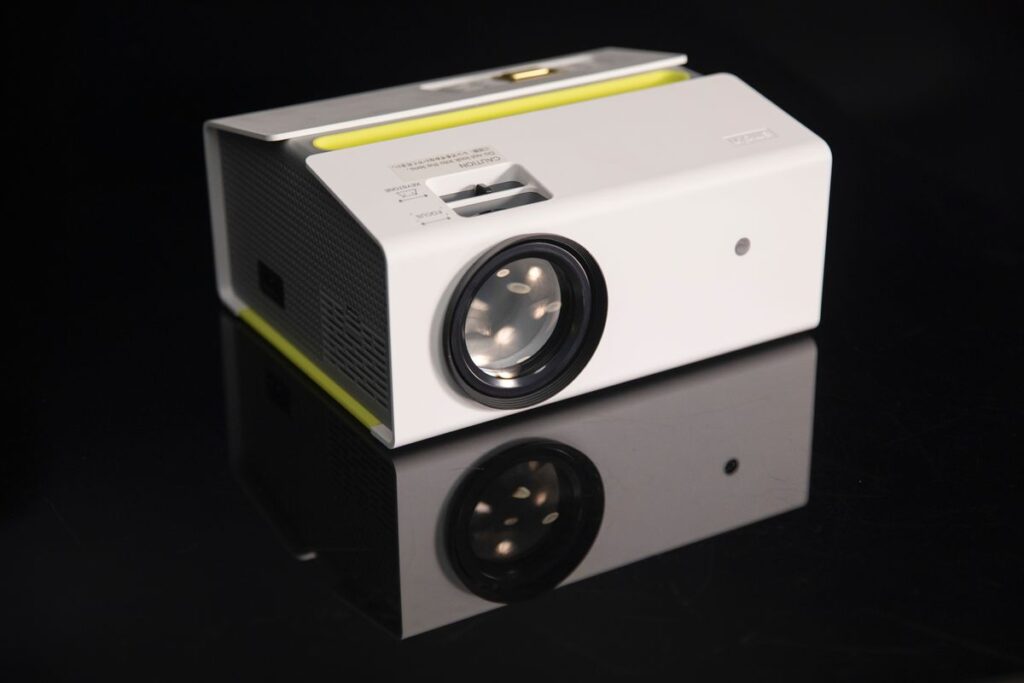
12. Noise:
When comparing TV vs Projectors in terms of noise, televisions generally do not produce any noticeable Noise or Sound during operation. However, you can hear a mild noise from the moving components and fan inside a Projector. So, TV grabs another point here.
Television – 6
Projector – 6
13. Cost:
When it comes to price, Projectors are a lot cheaper than TVs. If you compare the price of a 55″ 4K Television with a 4K Projector, the Projectors are Cost-effective. However, the additional accessories required for projectors can increase their overall cost compared to TVs. Nonetheless, projectors offer flexibility as they can be used by projecting onto a wall or plain white cloth.
The cost of Projector Vs TV ultimately depends on your specific requirements and specifications. Therefore, it’s not fair to favor either side based solely on price.
Television – 6
Projector – 6
14. Power Consumption:
Power consumption of TVs and projectors varies, depending on the type and model. Generally, Projectors consume more power to light up the Lamp, in the traditional lamp-based projectors. However, the modern LED Projectors are more energy-efficient. Moreover, Portable Pico Projectors run on Battery. Overall, it can be said that Projectors consume slightly more electricity than Televisions.
Television – 7
Projector – 6
15. Flexibility:
Projectors offer more flexibility in terms of Screen Size and Placement. TVs generally come in one standard type aside from differences in display technology and screen size. Whereas, there are over 15 Types of Projectors, providing users with a wide range of choices. For instance, if you need to place the projector close to the screen, get Short-Throw Projector. For installations where the projector needs to be positioned behind the screen, opt for a Rear-Throw Projector. If you want to place it outside, get Outdoor Projector that offers higher Lumens. Similarly, we have Portable Projectors, Mini Projectors, 3D Projectors and more.
Therefore, Projectors is a Clear Winner here.
Television – 7
Projector – 7
Surprisingly, the comparison results in a tie. Therefore, you now need to determine which factors are most important to you. Based on these considerations, you can decide between a TV and a projector. Additionally, we’ll provide further clarity by outlining their specific use cases.
Use Cases (Projector):
We’ll begin by discussing the various applications for projectors, followed by exploring the different uses of TVs.
1. Home Theater:
These days, people prefer to watch movies and shows on OTT platforms from the comfort of their homes with their families. So, watching it on a small TV Screen can lessen the enjoyment. However, Projectors offer a theater-like atmosphere perfect for movie enthusiasts.
Projectors are ideal for Home Theater because they provide a large, cinematic experience. You can even increase the screen size up to 100-150 inches as well, depending on your room’s dimensions.
2. Outdoor Entertainment:
Since Projectors are lightweight and portable, they are perfect for Outdoor movie nights and Gatherings. It is recommended to use them at Night for the best visual experience. However, by using a projector with higher lumens and providing a shade over the screen, you can enjoy outdoor viewing even during the day.
3. Presentations and Meetings:
Projectors are incredibly versatile and can be used in various settings such as conference rooms, classrooms. etc. Additionally, you can make size adjustments based on the room layout and audience size.
4. Gaming:
It is a gamer’s dream to enjoy gaming on a larger screen for the ultimate entertainment experience. Additionally, projectors enhance visibility, offer low input lag, and provide higher refresh rates, making them a real treat for gamers.
5. Portability:
So, if you are travelling or going camping, carrying a Portable Projector can be very convenient for passing the time. Moreover, it offer great flexibility in areas that has limited or no power sources, as Portable Projectors runs on batteries.
Use Cases of TVs:
1. Living Room or Bedroom:
A TV is the best choice for a permanent setup in your Living room. Since living rooms often have Ambient Light interference, TVs are effective at countering it. Moreover, you get instant access with easy setup and minimal adjustments.
2. Gaming:
Gaming-specific TVs can offer low input lag and high refresh rates, making them ideal for gamers. Additionally, the LED screens provide enhanced gaming visuals with HDR support that further enhances gaming experience.
3. Daily Viewing:
The convenience of a TV lies in its ease of use. You can simply turn it on and enjoy watching TV shows and movies without any setup or technical knowledge required. Additionally, TVs often come with a built-in sound system that provides good audio quality.
4. Space Efficiency:
TVs are available in various sizes to fit different room layouts and space constraints. They also allows flexible placement options as you can choose to mount it to the wall or place it on a stand.
5. High Definition Content:
TVs offer high-resolution displays with support for HDR content, enhancing visual quality for movies and shows.

Difference Between Projector Vs TV in Tabular Form:
| Projector | TV |
|---|---|
| Projectors are cheaper compared to HD TVs | HD Televisions are expensive. And the price keeps increasing as the size and resolution increase |
| It is good for the eyes | Watching TV for a long time can damage health |
| The Maintainance Cost is more | The Maintainance Cost is less |
| It offers lower Picture quality when compared to TV | Best Picture Quality (if you get OLED or QLED TVs) |
| Slightly more Power Consumption | Also consumes Power, but less than Projectors |
| Easily Portable (Especially the Pico Projectors and foldable screens) | Not Portable. Any slight damage to the screen would result in a replacement |
| Not suitable in Daylight | Suitable in all conditions |
| The screen size can be adjusted. | Screen size cannot be adjusted |
| You require large room for larger projection | Suitable for smaller rooms |
| Requires technical knowledge and efforts to setup | Easy to set up and use |
Final Words on TV Vs Projector:
TV can be used at Home and Office for Entertainment Purposes. However, a Projector can be useful in every field. These days, you can even find Android Projectors, which work the same as any other Smart TV. Or, you could even use a Fire Stick to turn your ordinary projector into a Smart Projector.
Besides that, a Projector can be used at home to watch movies with family on a bigger screen. It can be used in Educational fields like schools and colleges, accommodating large audiences. Projectors are used in the Entertainment sectors like Gaming and movie theatres as it would cost 50 times more to buy a Television of that size. Moreover, projectors find utility in offices and other business environments.
We have compared every aspect of Projector Vs TV to see which one is better. Ultimately, the choice between the two depends on individual preferences and specific setup requirements.
Basically, if you have a bright room with lots of windows, you might consider buying a TV. However, if you can control the Ambience by putting on curtains and through other methods, you can go for Projectors.
Between TV Vs Projector, I would definitely choose the Projector. Because it is cost-efficient, provides a larger screen, and it does not harm your eyes. These points are enough for me to choose the Projector over the Television.

